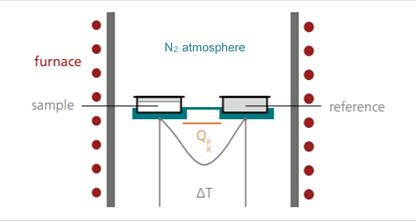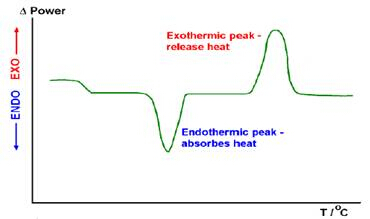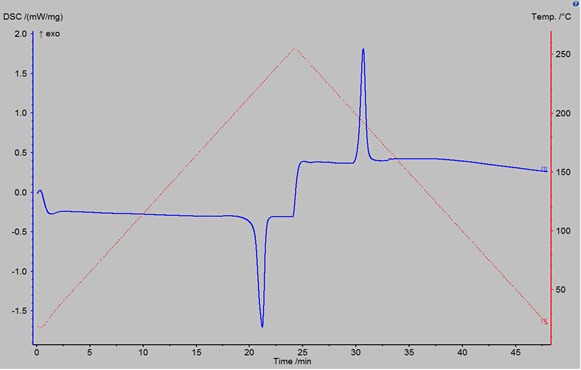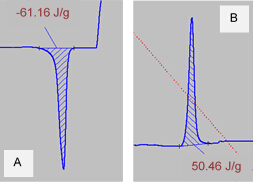微分走査熱量測定
概要
出典:ダニエル・N・ビーティとテイラー・D・スパークス、ユタ大学材料工学科、ソルトレーク・シティー、UT
微分走査熱量測定(DSC)は、材料の熱特性を特徴付ける重要な測定です。DSCは、主に材料が加熱する時に貯蔵される熱量(熱容量)と、化学反応または相変化の間に吸収または放出される熱を計算するために使用されます。しかし、この熱の測定は、ガラス転移温度、ポリマー結晶性などの他の重要な特性の計算にもつながり得る。
ポリマーの長い鎖状の性質のために、ポリマー鎖が絡まって乱れるのは珍しくない。その結果、ほとんどのポリマーは、ポリマーの残りの部分が非晶質である部分的に結晶性に過ぎません。この実験では、DSCを利用してポリマー結晶性を決定します。
原則
名前が示すように、微分走査熱量測定は、目的のサンプルと既知の熱特性を持つ参照サンプルとの間の熱流の差動に依存します。実際、ヒートメーターで熱を正確に測定することは非常に困難です。測定は、サンプルが熱を吸収する鍋内に配置され、通常、より大きな炉内で発生するという事実によってさらに複雑になります。より正確な測定には、サンプルの温度を監視し、温度変化を生成するためにどのような熱流れが存在していた必要があるかを計算する必要があります。
したがって、DSCは、サンプルと参照の両方の温度の同時または順次測定を含む。パンおよび周囲の環境に対する熱寄与および損失を考慮しながら、サンプルの内外の熱を正確に測定するには、サンプルと参照の両方の測定がまったく同じ環境と熱条件で行われるべきです。鍋への準備も、参照とサンプルの間で一貫している必要があります。これらは、鍋を密封し、蓋に穴を突く圧着を含み、炉内の不活性雰囲気との平衡を可能にし、サンプル中に相変化が発生した場合に鍋内の加圧を回避する。
DSC サンプルのセットアップとヒート セルの概略を図 1 に示します。スキャンごとに、DSC には空の参照パンとサンプル パンが含まれています。DSCは、基準パンとサンプルパンを設定温度(ユーザーによる測定前に定義)に保つために必要な電力の差を読み取ります。サンプルパンは、サンプルが熱を吸収するとき(吸熱反応で)加熱するより多くの電力を必要とし、サンプルが熱を放つとき(発熱反応で)冷却するより多くの電力を必要とします。

図1:DSCサンプルのセットアップとヒートセルの回路図
すべてのDSC測定の基準位置に空のパンが配置されます。すべての熱特性評価技術では、ベースライン測定は、サンプル位置の炉内の空のパンで最初に実行されます。この測定値は大気の変化を占め、次のサンプル測定値から自動的に差し引かれます。結晶性測定では、正確に測定された量のサンプル材料を別のパン(炉内のサンプル位置に配置)に配置し、ベースラインと同じ測定プログラムを使用して実行します。結晶性率は、サンプル測定から得られた値を用いて計算される。使用される方程式は次のとおりです。
% 結晶性 = (方程式 1)
= (方程式 1)
一般的な DSC 結果曲線を図 2 に示します。溶融熱(ΔHm)は、吸熱ピーク下(測定の加熱段階で存在する)の下で面積を取ることによって得られ、冷結晶化の熱(ΔHc)は、発熱ピーク下の領域を取ることによって得られる(冷却中に存在する)測定の段階);付属のソフトウェアは、サンプル測定からこれらの値を計算するために使用されます。試料の100%結晶形(ΔHm°)の溶融の既知の熱は、ポリマーパーセント結晶性を計算するためにも知らなければならない材料特性です。

図 2: DSC 結果曲線の概略図除熱および吸熱ピークは標識される。
熱容量測定を行う場合、1つの追加ステップが追加されます:サンプル測定を実行する前に、ベースラインと同一の測定が標準材料の正確に測定された量で実行されます。標準材料は、サファイアなどの十分に特徴付けられた熱容量を持つ化合物でなければなりません。サンプル材料は、ベースラインおよび標準と同じ測定プログラムを使用して実行されます。サンプルの熱容量と熱流量は、ユーザーが付属のソフトウェアで計算します。ベースライン測定を差し引き、標準材料の熱容量を使用して温度から熱流に向かいます。
手順
- マシンの電源を入れ、約1時間ウォームアップします。
- 圧縮窒素タンクと液体窒素タンクの両方が満杯で、それらを接続するバルブが開いていることを確認します。圧縮窒素圧力流量は、レギュレータの調整ノブによって10psiに設定されます。
- 2つの空の鍋を準備します。各のふたに小さな穴を突き、圧着プレスを使用してシールします。3つの炉のふたを取り外し、炉内の2つの円形センサーに鍋を置きます。3つの蓋をすべて交換してください。
- DSC 3500 Sirius というラベルの付いたアイコンをクリックして、マシンのソフトウェアを起動します。
- [ファイル] → [新規] を選択します。[計測定義]ウィンドウが開きます。情報入力を求める4つのタブが含まれています。最初のタブは[設定]タブです。これは、計測器に関する情報が含まれており、標準手順を使用して測定を実行するために変更する必要はありません。
- [ヘッダー] というラベルの付いた 2 番目のタブをクリックします。[計測タイプ]で[補正]を選択します。これにより、ベースライン測定値が補正ファイルとして保存され、後でソフトウェアによってサンプル測定値から差し引かれます。
- [サンプル] セクションの [ID と名前] のサンプルとして日付を使用して、ベースラインを入力します。
- [温度キャリブレーション]で、[選択]をクリックします。これにより、別のウィンドウが開きます。コンピュータに保存されている最新の温度キャリブレーションファイルを見つけて選択します。
- 結晶度測定の場合は、[感度キャリブレーション]の下の[選択]をクリックし、コンピュータに保存されている最新の感度キャリブレーションファイルを選択します。
- 3 番目のタブ([温度プログラム])を選択します。
- [ステップ条件]の下にリストされている[パージ 2]ボックスと[保護]ボックスをオンにします。これにより、すべての温度ステップで窒素パージガスがオンになります。
- [ステップ カテゴリ]で[初期]を選択し、[開始温度]として入力 20 °C を選択します。
- [ステップ カテゴリ]で[ダイナミック]を選択し、[終了温度]の温度を入力します。この末端温度は、ポリマー試料の報告された溶融温度よりも約30°C高くする必要があります。アルミニウム鍋によって許容される最高温度は600 °Cである;予防措置として、550°Cより高く行かないでください。加熱速度として10 K/分を入力します。
- [ステップ カテゴリ]で[ダイナミック]を選択し、[終了温度]に入力 20 °C を選択します。
- 画面上部で、2番目の冷却ステップのLN2の下にあるドロップダウン矢印をクリックして、炉を室温に戻します。[自動] を選択します。これは、加熱ステップが終了した後、炉を冷却するために自動的に液体窒素をオンにする温度プログラムを指示します。
- [ステップ カテゴリ] で [最終] を選択します。終了温度として20°Cを入力します。
- プログラムは、緊急リセット温度を求めます。温度プログラムで設定した最高温度より10°C高い温度を入力します。機械が故障した場合に設定温度より高い加熱を停止する保護設定です。これはサンプルを気化し、機械を損傷する可能性がある温度に加熱から炉を保護します。
- その後、プログラムは最終スタンバイ情報を要求します。この情報は、炉を平衡状態に保つために最大2時間、最終温度で炉を保持しますが、収集されたデータには影響しません。スタンバイ温度に20°C、加熱速度として40 K/分、最大スタンバイ時間2時間を入力します。
- [最後のアイテム] というラベルの付いた [4 番目] タブを選択します。
- [ファイル名] の右側にある [選択] をクリックします。スキャンを保存するコンピュータ上の場所を選択し、日付 ([ヘッダー] タブに表示されているのと同じ名前) で Baseline という名前を付けます。
- [計測定義]ウィンドウの右下隅にある[進む]をクリックします。新しい小さなウィンドウが表示され、温度プログラムで定義されている初期温度と現在の炉温度が一覧表示されます。プログラムを開始するには、現在の炉の温度が初期温度の5度以内でなければなりません。
- 炉の温度が初期プログラム温度の5度以内の場合は、[開始]をクリックすると測定が開始されます。炉の温度が低すぎる場合は、スタートをクリックすると、機械は測定を開始する前に加熱と平衡ステップを行います。炉が熱すぎる場合は、[診断] → [ガスとスイッチ] を選択します。LN2のチェックボックスをオンにして、温度が初期の5度以内に達するまで液体窒素が流れるようにします。次に、[LN2] ボックスをオフにし、[開始] を押して測定を開始します。
- ベースライン スキャンが実行されたら、空のベースライン パンを削除し、サンプルを含むパンに置き換えます。鍋の直径は約6ミリメートルで、体積は25マイクロリットルなので、非常に少量のサンプルが必要です。鍋に収まる小さく切ります。熱流と正確なDSC測定値を確保するために、サンプルピースの薄い層を配置して、鍋の底部全体が覆われます。
- [ファイル] → [開く] を選択します。プログラムが現在の構成を削除し、ベースライン スキャンを見つけて開くように求められたら、[OK] をクリックします。
- [計測定義]ウィンドウが開き、[高速定義]ページが表示されます。[計測タイプ]で[補正+サンプル]を選択します。
- [サンプル] セクションで、[ID と名前] にサンプル名を入力し、サンプル質量をミリグラム単位で入力します。
- ウィンドウの下部にある [選択] をクリックします。名前を付けて保存する場所を選択します。
- [転送] を選択します。小さいウィンドウが表示されたら、[開始] をクリックします。
- 測定が完了したら、プログラムを閉じ、圧縮窒素タンクをオフにして、機械の電源を切ります。
- サンプルスキャン用に保存した測定値を見つけてダブルクリックします。これにより、Proteus解析ソフトウェアでスキャンが開きます。
- 溶融および再結晶曲線の下の領域を見つけるためにソフトウェアを使用してください。これらの値は、1グラムあたりのジュールにおけるポリマーサンプルの融解と冷たい結晶化の熱である。
- 結晶化率は、上記の式を使用して計算できます。
結晶性 =
結果
図3は、ポリブチレンテレフタレート(PBT)ポリマー試料に対するDSCパーセント結晶性試料スキャンの結果を示す。結果は、DSC 電力読み取り (サンプルのミリグラムあたりミリワット) の詩時間として表示されます。電源読み取り値(図3の青色のトレース)は、空のリファレンスパンと比較してサンプルパンの温度を変更するために必要な追加電力を示します。温度プログラムは、図 3に赤い破線としても表示されます。青いトレースの最初のピークは吸熱ピークです。その面積は、ポリマー試料の溶融熱の値を与える。第2のピークは、その領域がポリマー試料の結晶化熱の値を与える発熱ピークである。
図4は、PBTスキャンからの吸熱および吸熱ピークのズームビューを示しています(図3)。各ピークの面積が表示されます(プロテウス解析ソフトウェアを使用して計算)。これらの計算値から、このPBTポリマーサンプルの結晶化率は、式1とΔHm°の142 J/gの報告値を使用して計算されます。
% 結晶性 =  = 78.6% 結晶性
= 78.6% 結晶性

図3:ポリブチレンテレフタレートポリマー試料のDSC読み出し対時間は、DSC 3500を用いて実行する。使用される温度プログラムは、赤い破線の曲線としても表示されます。

図4:PBTポリマーDSCスキャンの吸熱ピーク(A)及び熱熱ピーク(B)のズーム図。各曲線の下の領域が計算されます。これらは、それぞれPBTポリマー試料の冷結晶化の溶融熱と熱に対応する。
申請書と概要
微分走査熱量測定は、溶融熱、結晶化熱、熱容量、相変化など、材料の多くの熱特性を決定するために使用される技術です。DSC測定は、ガラス転移温度やポリマーパーセント結晶性を含む追加の材料特性を計算するためにも使用できます。DSCは、機械で使用されるパンのサイズと形状に準拠する必要があり、空の参照とサンプルの差動熱比較に基づいている非常に小さなサンプルを必要とします。試験対象のポリマーの100%結晶形の融解熱が知られている場合、ポリマーパーセント結晶度計算は比較的簡単である。結晶性のパーセントを決定できる他の特性評価方法には、100%結晶性と100%アモルファスバージョンのポリマーを必要とする密度測定、および完全に混合できるサンプルを必要とするX線回折が含まれます。シリコンなどの標準的な材料で。
結晶性率は、毎日使用されるポリマー材料の特性の多くに大きく寄与する重要なパラメータです。結晶性のパーセントは、ポリマーがいかに脆い(高い結晶性)であるか、またはポリマーがいかに柔らかく、延性(低結晶性)であるかにおいて役割を果たす。 ポリエチレンは、最も広く使用されているポリマー材料の一つであり、材料特性に結晶性の重要性の良い例です。HDPE(高密度ポリエチレン)は、より結晶性の形態であり、したがって、ゴミ箱やまな板に使用される硬く、より脆いプラスチックであるのに対し、LDPE(低密度ポリエチレン)は結晶性が低く、使い捨てプラスチックに使用される延性プラスチックです。ショッピングバッグ。ポリマー結晶性はまた、透明性と色に影響を与えることができます。結晶性の高いポリマーは、着色が難しく、多くの場合、より不透明です。結晶性のパーセントは、生地に使用されるポリマーから、防弾チョッキに使用されるものまで、毎日異なるプラスチックと異なる形態の同じプラスチックを作成し、使用する方法に大きな役割を果たしています。これらの特性に影響を及ぼし得る他のポリマー特性は、結晶性値のパーセントに寄与し得る、以前の熱処理および架橋の程度を含む。
スキップ先...
このコレクションのビデオ:

Now Playing
微分走査熱量測定
Materials Engineering
37.1K 閲覧数

光学材料グラフィー パート 1: サンプル調製
Materials Engineering
15.3K 閲覧数

光学材料学 パート2:画像解析
Materials Engineering
10.9K 閲覧数

X線光電子分光法
Materials Engineering
21.5K 閲覧数

X線回折
Materials Engineering
88.2K 閲覧数

集束イオンビーム
Materials Engineering
8.8K 閲覧数

方向固化と位相安定化
Materials Engineering
6.5K 閲覧数

熱拡散率とレーザーフラッシュ法
Materials Engineering
13.2K 閲覧数

薄膜の電気めっき
Materials Engineering
19.7K 閲覧数

拡張測定による熱膨張の解析
Materials Engineering
15.6K 閲覧数

電気化学インピーダンス分光法
Materials Engineering
23.1K 閲覧数

セラミックマトリックス複合材料とその曲げ特性
Materials Engineering
8.1K 閲覧数

ナノ結晶合金とナノ粒サイズ安定性
Materials Engineering
5.1K 閲覧数

ヒドロゲル合成
Materials Engineering
23.5K 閲覧数
Copyright © 2023 MyJoVE Corporation. All rights reserved